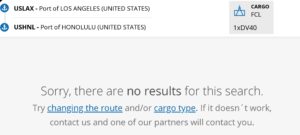The 2020 presidential race has begun. So, there are a number of questions that potential voters will ask and even challenge. One natural question is how well those a candidate sympathizes with the issues that affect their current constituents and eventually the United States at large. We recently came across a video of Rep. Tulsi Gabbard from Hawaii who in a townhall meeting in New York City said that she favors the Jones Act. This raises many questions especially since this very controversial law can help voters reveal how her personal views resonate with her own community, and even more importantly the broader interest of the United States.
First, The Jones Act is a federal law, which is also known as the Merchant Marine Act of 1920. It is a protectionist legislation focused on issues related to maritime commerce, including cabotage, which is the transport of people or goods between ports in the same country. It also provides sailors with additional rights, including the ability to seek damages from the crew, captain, or ship owner in the case of injury. Perhaps its most lasting effect is its requirement that goods shipped between U.S. ports be transported on ships built, owned, and operated by United States citizens or permanent residents.
While arguably it seems that this law may have many benefits from securing union jobs to protecting the interest of National Security, the reality is far from it. In fact, it is a topic of contention that has plague many coastal cities across the U.S., and even more notably Hawaii, Alaska, Texas, Puerto Rico and other U.S. territories. According to an article from the New York Post, the Jones Act is a large contributor to highway congestion in New York and noted that the cost of a specific cargo as compared to a foreign vessel was $50 million more expensive on a Jones Act ship. In addition, in this article it speaks of how the United States has grown dependent to foreign vessels to the extent that during the Gulf War the defense department had to borrow ships from the then Soviet Union.
If having to borrow ships from Russia during war time not enough to punch a hole on the National Security argument in itself, even experts agree that the Jones Act has hindered U.S. military capabilities. “If the fleet continues to lose ships, a lengthy, mass deployment on the scale of Desert Shield/Desert Storm could eventually require U.S. forces to rely on foreign-flagged ships for sustainment,” Air Force Gen. Darren W. McDew, head of the U.S. Transportation Command, told a Senate panel April 10, 2018.
Among the unintended consequences of the Jones Act, the environmental impact is one that has been severely overlooked by those who claim the benefits of it. Congestion is a large contributor to greenhouse gases that are devastating to the environment.
Then why exactly would Congress Representatives and Senators both Democratic and Republican, and especially someone who is very close to the issue continue to protect a law that seems to go against public interest? Could it be that many are not really looking at the law in a holistic manner and have failed to weigh its actual historical consequences? Or could it be that as indicated by the President of The Grassroots Institute of Hawaii, Keli’i Akina Ph.D., the transportation industry has the funds to lobby in their favor, while ordinary citizens need to live with the end results.
While there are very few leaders in Washington that one can recall as genuine and honest, very few from any political spectrum can argue, if anyone, that the late Senator John McCain will forever standout in history. Honorable Senator McCain understood the economics behind the Jones Act and how it negatively impacted his landlock state of Arizona and all Americans. It was such, that he attempted to repeal the Jones Act several times.
It is very easy to find pricing for delivery of containers from Los Angeles, California, to Shanghai, China, but it is quite difficult to research shipping rates from LA to Honolulu, Hawaii. Rates from LA to Honolulu for a 40-foot container seem to range from $8,000 to as high as $11,700. While the same container can be shipped from LA to Shanghai for as little as $420.
Exhibit 1: Estimated rates for 40ft container from Los Angeles to Shanghai 08/10/2019
![]()
Exhibit 2: Estimated rates for 40-ft container from Los Angeles to Honolulu 08/10/2019 not available





